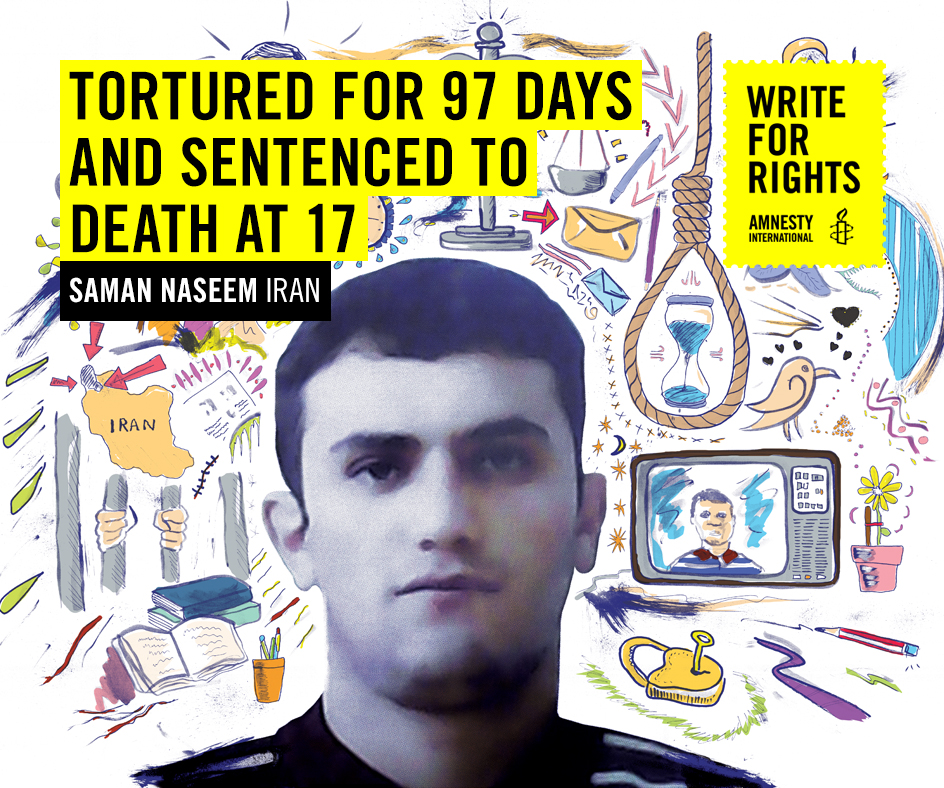
In a very rare piece of good news in an otherwise bleak landscape, Iranian authorities recently postponed the scheduled execution of juvenile offender Salar Shadizadi at the eleventh hour. He was to be hanged on November 28 for a killing that occurred when Mr. Shadizadi was just 15 years old.
Iran is one of the very few countries in the world that continues to execute juveniles. At least four juvenile offenders — including one female — have been executed already in Iran in 2015. This is a blatant violation of the Convention on the Rights of the Child, which Iran has ratified; Article 37 of the Convention states: “Neither capital punishment nor life imprisonment without the possibility of release shall be imposed for offenses committed by persons below eighteen years of age.”
Although news of the latest postponement is welcome (this is the third time that his execution was scheduled and postponed), Mr. Shadizadi still faces execution and he still has not been given a fair trial.
Branch 13 of Iran’s Supreme Court denied the request for a new trial, based on a December 2014 Supreme Court ruling that everyone on death row for crimes committed when they were under 18 was entitled to request a retrial.
The facts of the case suggest that the killing for which Mr. Shadizadi was convicted, which took place nearly nine years ago, was the result of a tragic mistake. Last month Mr. Shadizadi explained that he had “unintentionally” caused the “catastrophic” death of his childhood friend by stabbing, in the dark, a moving object that had frightened him. It was covered in green cloth, and he said he realized that it was his friend only after he had stabbed it.
This happened, he said, during a “silly game” where his friend had dared him to go into the garden at night, knowing that Salar Shadizadi was afraid of the dark and his grandmother had warned him since childhood that the garden was haunted by “evil spirits.” According to Iranian law, Mr. Shadizadi was sentenced to Qesas, or retribution and can only be spared the death penalty if the family of the victim agrees to accept a payment of money.
The life of another juvenile offender, Saman Naseem, continues to hang in the balance. Mr. Naseem is an ethnic Kurd; ethnic, linguistic and religious minorities in Iran, including Kurds, Arabs, and Baluchis, face a greater likelihood of charges for politically motivated and security-related crimes and are at an increased risk of severe torture and ill-treatment while in detention.
He was sentenced to death for taking part in armed activities against the state, which led to the death of a member of the Revolutionary Guards, when he was 17. As is very common in cases of security-related offenses, his confession was televised in September 2011.

Mr. Naseem reported that he had been tortured continuously over a period of more than three months in order to coerce him to make the confession. To compound the cruelty experienced by Mr. Naseem and his family, he was scheduled to be executed in February 2015 and for several days after the scheduled date, there were conflicting reports about whether the hanging did in fact take place.
He was eventually transferred to an unknown location and the authorities did not inform Mr. Naseem’s family about his fate or whereabouts. Perhaps because of the urgent messages sent by activists around the world, Saman Naseem’s request for a judicial review of his case was granted by the Supreme Court in April, which meant his conviction and death sentence were quashed and that he was entitled to a full retrial.
Saman Naseem is one of twelve featured cases in Amnesty International’s 2015 Write4Rights, which takes place in the days around International Human Rights Day–December 10. Thousands of activists will write letters to Iranian authorities calling for Mr. Naseem to be given a fair trial and not to be subjected to a penalty of death, and will also send messages of solidarity to Mr. Naseem’s family. In our experience, a huge outpouring of outrage by concerned citizens around the world over Iran’s severe human rights violations has been a key factor in achieving positive results.
Any positive results are very hard won. As of the beginning of November, Iran had already executed at least 830 people, more than the total number of executions in 2014 — which had already exceeded the total for 2013. Iran executes more people than any country other than China and has the highest per capita rate of executions in the world. Although the scope of the challenge is daunting, we are hopeful that the Iranian government will listen to world community and reverse course — abandoning the use of the death penalty against its citizens altogether, and certainly its use against its children.
Fantastic and beautiful online games always has online addiction solitaire game and because of its simplicity guys you have no need to confuse in play online game .I can tell you about this process After open the website you have to click game which you want to play